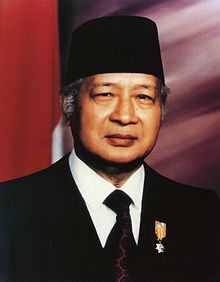

President of Indonesia
8 June 1921 Kemusuk, Yogyakarta Sultanate, Dutch East Indies
27 January 2008(2008-01-27) (86) Jakarta, Indonesia
27 March 1968 – 21 May 1998 Acting: 12 March 1967 – 27 March 1968
2nd President of Indonesia from 1967 to 1998 In this Indonesian name, there is no family name nor a patronymic. Suharto (/s uː ˈ h ɑːr t oʊ / ; Indonesian pronunciation (help ·info ) ; 8 June 1921 – 27 January 2008) was an Indonesian Army officer and politician, who served as the head of state and head of government of Indonesia he was also the second and the longest serving President of Indonesia. Widely classified as a dictator by foreign observers, Suharto was president for 31 years, from the coup d'etat against Sukarno in 1967 until his own ousting in 1998. The legacy of his 31-year rule, and his US$38 billion net worth, is still debated at home and abroad. Suharto was born in a small village, Kemusuk, in the Godean area near the city of Yogyakarta, during the Dutch colonial era. He grew up in humble circumstances. His Javanese Muslim parents divorced not long after his birth, and he lived with foster parents for much of his childhood. During the Japanese occupation of Indonesia, Suharto served in Japanese-organised Indonesian security forces. Indonesia's independence struggle saw his joining the newly formed Indonesian Army. Suharto rose to the rank of major general following Indonesian independence. An attempted coup on 30 September and 1 October 1965 was "countered" by Suharto-led troops. According to the official history made by the army, this attempt was backed by the Communist Party of Indonesia. The army subsequently led an anti-communist purge and Suharto wrested power from Indonesia's founding president, Sukarno. He was appointed acting president in 1967 and elected president the following year. He then mounted a social campaign known as "de-Sukarnoization" to reduce the former president's influence. Support for Suharto's presidency was active throughout the 1970s and 1980s. By the 1990s, the New Order's authoritarianism and widespread corruption were a source of discontent and, following the 1997 Asian financial crisis which led to widespread unrest, he resigned in May 1998. Suharto died in January 2008 and was given a state funeral. Under his "New Order" administration, Suharto constructed a strong, centralised and military-dominated government. An ability to maintain stability over a sprawling and diverse Indonesia and an avowedly anti-Communist stance won him the economic and diplomatic support of the West during the Cold War. For most of his presidency, Indonesia experienced significant industrialisation, economic growth, and improved levels of educational attainment. Plans to award National Hero status to Suharto are being considered by the Indonesian government and have been debated vigorously in Indonesia. According to Transparency International, Suharto is the most corrupt leader in modern history, having embezzled an alleged US$15–35 billion during his rule.

We use cookies
We use cookies and other tracking technologies to improve your browsing experience on our website, to show you personalized content and targeted ads, to analyze our website traffic, and to understand where our visitors are coming from. Privacy Policy.